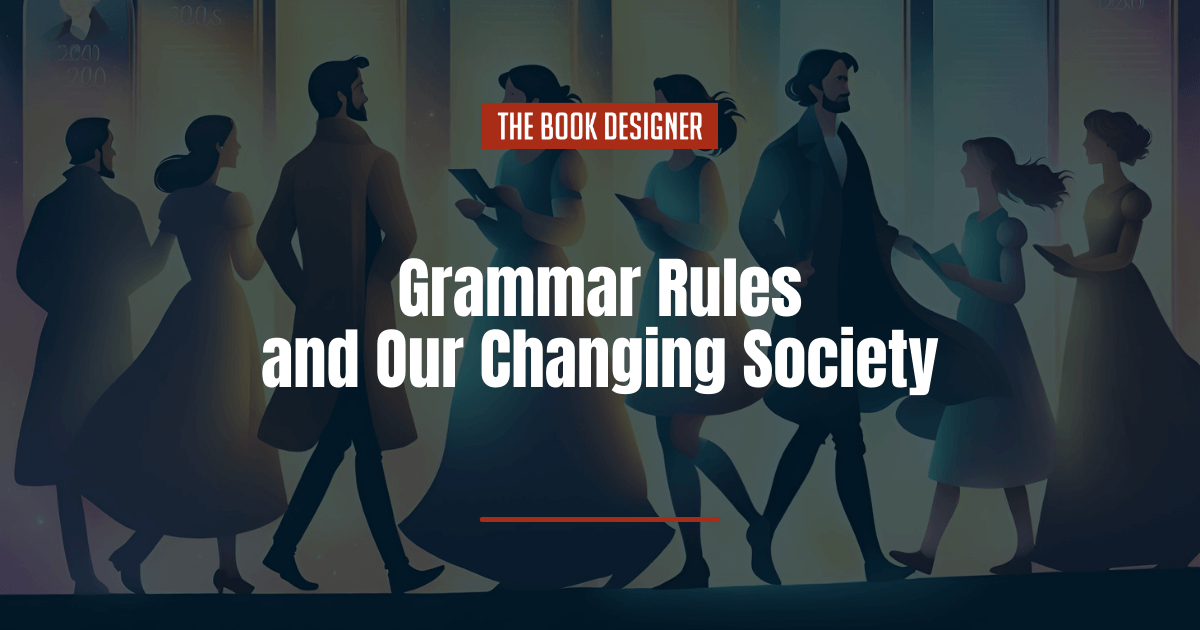What exactly is grammar? Grammar consists of words (morphology) and how we put them into sentences (syntax). Most people also put punctuation into the grammar category.
There are two schools of thought when it comes to grammar rules:
- Prescriptivism: If you are a prescriptivist, you believe that grammar rules are rules and that is pretty much it. Occasionally, with a good reason, you will break a rule. Note, however, that we have many different style guides that sometimes disagree. And, English is the only major language that does not have an association that presides over the language and makes the rules.
- Descriptivism: If you are a descriptivist, you believe that language is alive and ever changing—and that the way people speak and write actually creates grammar rules.
Here’s what you need to know about ever-evolving grammar rules:
How Have Grammar Rules Changed? Or Have They?
Think about how grammar has changed, let’s say, since the days of Shakespeare. Has it really? What changes most is actually vocabulary. Obviously, language has changed a great deal since Shakespeare wrote his plays. Technology and society change our vocabulary constantly. Thousands of new words are added to the dictionary every year. Learning the ins and outs, such as when to use nor, can be tricky even for native speakers. In fact, the dictionary is updated on a regular basis. Words are added, and some are taken out. Who heard of “mansplaining” a few years ago?
However, syntax has not really changed. Nor has punctuation. We still put our sentences together pretty much the same as we always have. Verbs have subjects and objects, prepositional phrases perform the same functions they always have, tenses haven’t changed, and commas go in the same places they went a century ago. And the war over the Oxford comma still rages on.
It is societal change that prompts much of the evolution of our language, and copyeditors are now the guardians of making sure correct (and politically correct) language is used.
The Singular They
There’s controversy around the singular usage of they. But if you look back through history, they has been used to refer to individuals since at least the time of Shakespeare. It’s been used by Dickens, George Bernard Shaw, and Jane Austen. In other words, it’s nothing new. In all likelihood, you use the singular they regularly in conversation, probably without even giving it a second thought. Consider these examples from Wikipedia:
“Somebody left their umbrella in the office. Could you please let them know where they can get it?”
“My personal rule is to never trust anyone who says that they had a good time in high school.”
“The patient should be told at the outset how much they will be required to pay.”
“But a journalist should not be forced to reveal their sources.”
You’ve likely said similar sentences in your daily life without even thinking about it. And when a person who is non-binary or genderqueer uses they/them as their personal pronoun, the usage is no different.
One thing to note is that when using the singular they, you use a plural verb as you would when using plural they, rather than the singular verb you’d use with many other singular pronouns like he or she. So you would say:
“They have a great smile.”
Not:
“They has a great smile.”
While we think of have and has as plural or singular, they’re really not. For example, “I” is a singular pronoun that we use “have” with:
“I have a great smile.”
Where do the grammarians stand on this singular usage of they? The Chicago Manual of Style advises against using the generic singular they whenever possible in formal writing, but they do recognize the specific singular they in formal writing when talking about a person whose pronouns are they/them. Merriam-Webster also recognizes the specific singular form as well as the generic singular.
Other Societal Grammar Rules & Issues Around Them
Language is how we communicate, and we don’t want to insult. We don’t want to be misogynist or racist in our writing. We don’t want to talk down to readers. Writers and editors need to consider the narrator, and in cases of creative writing, dialog as well. How far can we go in dialog?
Here are a few things to keep in mind while writing:
Black and White
When should we capitalize black or white (or brown) when referring to race or ethnicity? In the 17th edition of the Chicago Manual of Style (published in 2017), it was prescribed that none of those terms should be capitalized in reference to race. But in June of 2020, they released an update that they addressed on their blog:
Specifically, we now prefer to write Black with a capital B when it refers to racial and ethnic identity. At the same time, we acknowledge that, as a matter of editorial consistency, White and similar terms may also be capitalized when used in this sense. We continue to recognize that individual preferences will vary, and we acknowledge that usage may depend on context. A correction has been made to CMOS Online and will also appear in subsequent printings of the seventeenth edition.
There has been some controversy around capitalizing White in the same way that Black, Brown, or Indigenous is capitalized, but the MacArthur Foundation has an interesting take on why White should also be capitalized:
Choosing to not capitalize White while capitalizing other racial and ethnic identifiers would implicitly affirm Whiteness as the standard and norm. Keeping White lowercase ignores the way Whiteness functions in institutions and communities.
That said, some publishers and publications choose not to capitalize White in the same way they capitalize Black, Brown, or Indigenous.
Big Words
Some writers like to use big words to make their readers think they are smart (or erudite). Editors generally change high-falutin words and long, tangled sentences into simpler writing. This is particularly true in nonfiction, but can apply to fiction as well.
Consider your audience. If you’re writing a practical nonfiction book, consider that not everyone who reads it was an English major. Making your writing easy for readers to understand is an artform all in itself, so save the 50-cent words for your poetry or literary fiction.
Misogyny
We no longer use words like chairman, postman, fireman, policeman, or even actress. We use chairperson, postal worker or letter carrier, fire fighter, police officer, and often actor for either gender of thespian. And words like housewife are generally derogatory these days as well; it is no longer the 1950s.
Shades of Meaning
Aggressive and assertive are not the same. One has a negative connotation while the other is positive. We need to make sure we say exactly what we mean. There is a difference among laid off, downsized, fired, and sacked.
Be aware of misogyny in your shades of meaning, too. For example, are you referring to men as leadership material while referring to women as overbearing for the same behaviors? Do you write a man who stands up for himself as assertive while a woman who does the same as aggressive?
Consider what inherent biases might be subconsciously coming through in your writing.
Stereotypes
I was talking to some writer friends, and they brought up the point of stereotypes in developing characters. Make sure not all your good guys are of a certain race or religion or geographic area or even gender or age. And be careful to avoid giving certain groups stereotypical characteristics. Stereotypes still exist in our society.
Be Careful of Dialects
Different regions of the world, often within countries, have different dialects. Attempting to capture those dialects if you’re not a native speaker can be especially challenging.
Consider AAVE (African American Vernacular English). Many parts of US society consider those who speak AAVE to be less educated or of lower socioeconomic status. For that reason, many speakers of AAVE use code-switching when speaking to groups who do not natively speak AAVE, in order to dispel those stereotypes.
But AAVE has it’s own distinct grammar, pronunciation, and vocabulary that, arguably, makes it it’s own unique language. Because of that, trying to incorporate a character who speaks in AAVE into your writing (if you’re not a native speaker), can come across as insensitive or even racist.
The bottom line if you want to incorporate a dialect or language that you don’t natively speak: find a person (or multiple people) who does to beta read your work to make sure you’re getting it right and not just catering to stereotypes.
Final Thoughts
Language is ever-evolving and as authors, it’s important to keep up with current standards and conventions. Consider how outdated books written in the 19th century or even the 20th century can sound, based purely on the way their language is used. That doesn’t mean the books don’t hold literary value, but trying to write a contemporary novel in the style of Jane Austen isn’t going to ring true to your readers.
Editor’s note: This article is adapted and updated from one originally written by Arlene Miller, aka The Grammar Diva.




